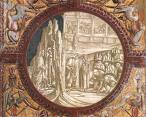
[This is taken from Augustine Calmet's Phantom World, originally published in 1850, revised and edited by D. J. McAdam, 2010. Copyright as such.]

Were we to believe what is said by the poets concerning the effects of magic, and what the magicians boast of being able to perform by their spells, nothing would be more marvelous than their art, and we should be obliged to acknowledge that the power of the demon was greatly shown thereby. Pliny relates that Appian evoked the spirit of Homer, to learn from him which was his country, and who were his parents. Philostratus says that Apollonius of Tyana went to the tomb of Achilles, evoked his manes, and implored them to cause the figure of that hero to appear to him; the tomb trembled, and afterwards he beheld a young man, who at first appeared about five cubits, or seven feet and a half high—after which, the phantom dilated to twelve cubits, and appeared of a singular beauty. Apollonius asked him some frivolous questions, and as the young man jested indecently with him, he comprehended that he was possessed by a demon; this demon he expelled, and cured the young man. But all this is fabulous.
Lactantius, refuting the philosophers Democritus, Epicurus, and Dicearchus, who denied the immortality of the soul, says they would not dare to maintain their opinion before a magician, who, by the power of his art, and by his spells, possessed the secret of bringing souls from Hades, of making them appear, speak, and foretell the future, and give certain signs of their presence.
St. Augustine, always circumspect in his decisions, dare not pronounce whether magicians possess the power of evoking the spirits of saints by the might of their enchantments. But Tertullian is bolder, and maintains that no magical art has power to bring the souls of the saints from their rest; but that all the necromancers can do is to call forth some phantoms with a borrowed shape, which fascinate the eyes, and make those who are present believe that to be a reality which is only appearance. In the same place he quotes Heraclius, who says that the Nasamones, people of Africa, pass the night by the tombs of their near relations to receive oracles from the latter; and that the Celts, or Gauls, do the same thing in the mausoleums of great men, as related by Nicander.
Lucan says that the magicians, by their spells, cause thunder in the skies unknown to Jupiter; that they tear the moon from her sphere, and precipitate her to earth; that they disturb the course of nature, prolong the nights, and shorten the days; that the universe is obedient to their voice, and that the world is chilled as it were when they speak and command. They were so well persuaded that the magicians possessed power to make the moon come down from the sky, and they so truly believed that she was evoked by magic art whenever she was eclipsed, that they made a great noise by striking on copper vessels, to prevent the voice which pronounced enchantments from reaching her.
These popular opinions and poetical fictions deserve no credit, but they show the force of prejudice. It is affirmed that, even at this day, the Persians think they are assisting the moon when eclipsed by striking violently on brazen vessels, and making a great uproar.
Ovid attributes to the enchantments of magic the evocation of the infernal powers, and their dismissal back to hell; storms, tempests, and the return of fine weather. They attributed to it the power of changing men into beasts by means of certain herbs, the virtues of which are known to them.
Virgil speaks of serpents put to sleep and enchanted by the magicians. And Tibullus says that he has seen the enchantress bring down the stars from heaven, and turn aside the thunderbolt ready to fall upon the earth—and that she has opened the ground and made the dead come forth from their tombs.
As this matter allows of poetical ornaments, the poets have vied with each other in endeavoring to adorn their pages with them, not that they were convinced there was any truth in what they said; they were the first to laugh at it when an opportunity presented itself, as well as the gravest and wisest men of antiquity. But neither princes nor priests took much pains to undeceive the people, or to destroy their prejudices on those subjects. The Pagan religion allowed them, nay, authorized them, and part of its practices were founded on similar superstitions.
© D J McAdam. Please note: all applicable material on this website is protected by law and may not be copied without express written permission.
Home | Book Collecting | Folklore / Myth | Philately | Playing Cards | Literature | Contents